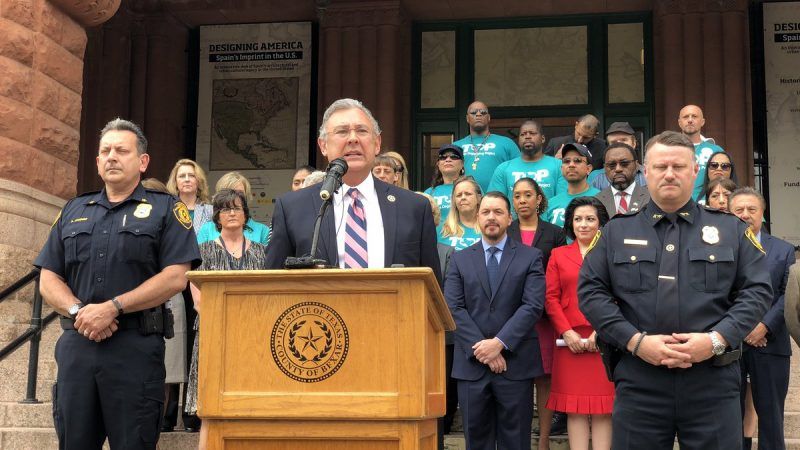San Antonio Prosecutor Will Stop Prosecuting Trace Drug Amounts and Petty Pot Possession
The Bexar County District Attorney plans to stop prosecuting people for trace drug amounts and less than one ounce of pot in order to focus resources on violent crime.

A Texas district attorney will no longer prosecute trace amounts of hard drugs or amounts of marijuana under one ounce, in what will be one of the more aggressive attempts by a prosecutor in the Lone Star State to divert resources away from petty drug crimes.
Recently elected Bexar County District Attorney Joe Gonzales, whose jurisdiction includes San Antonio, announced today that his office will no longer prosecute possession of trace amounts of narcotics such as heroin, cocaine, and methamphetamines under .25 grams. In addition, Gonzales' office will no longer prosecute marijuana possession of less than an ounce.
The move follows several other Texas prosecutors' offices that have taken steps to divert resources away from petty drug prosecutions. Dallas County District Attorney John Creuzot announced in April that his office would not prosecute first-time marijuana offenses or trace amounts of drugs under .01 grams, and the Travis County D.A. instituted a similar policy for trace drugs under .01 grams that same month. An amount of drugs that small is basically invisible residue.
"We believe that our resources need to be focused on the most serious violent crimes and criminals, and we have to make decisions on where to put our people and how to use those resources," Christian Henrickson, the Bexar County D.A.'s chief of litigation, tells Reason. "It makes more sense to put them on violent crimes as opposed to small quantities of drugs that have a low conviction rate to start with."
Henrickson says that last year there were 5,000 marijuana cases filed in Bexar County, and he expects the impact of the new policy on marijuana prosecutions to be "fairly significant."
As Reason reported, petty drug amounts make up the bulk of narcotics prosecutions in Texas; a study by Human Rights Watch and the American Civil Liberties Union found 78 percent of people sentenced to incarceration for felony drug possession in Texas in 2015 possessed under a gram—roughly the weight of a paperclip. The study's authors found one Texas man was sentenced to 15 years in prison for possession of trace amounts of methamphetamines so insignificant that the drug lab couldn't even assign a fractional weight to it.
Law enforcement has opposed reform efforts in other Texas counties, and Bexar appears to be no different. Area law enforcement officials, granted anonymity by local news station KSAT 12, complained that:
- The new policy was not communicated to them after being instituted;
- it invalidates their police work;
- and it prevents them from getting suspects to supply information in other cases
Last year KSAT reported that 40 percent of San Antonio's murders in 2018 went unsolved, a slightly higher clearance rate than the national average. If local police get tired of arresting people for possessing drug-laced plastic bags, only to see the D.A. refuse to prosecute them, maybe that would be a good place to channel their energy.


Show Comments (10)